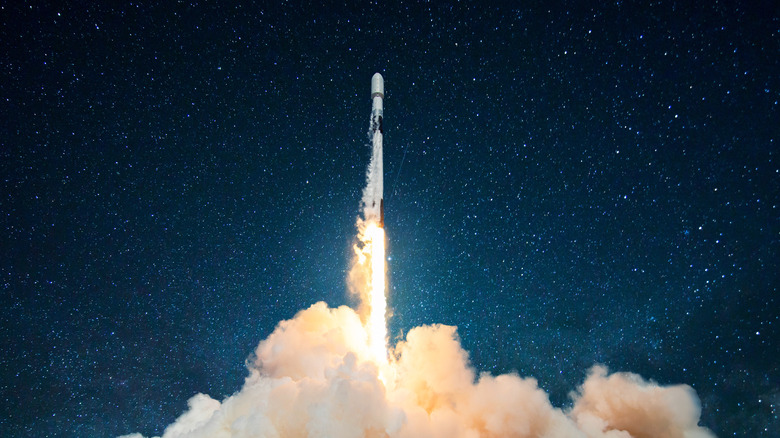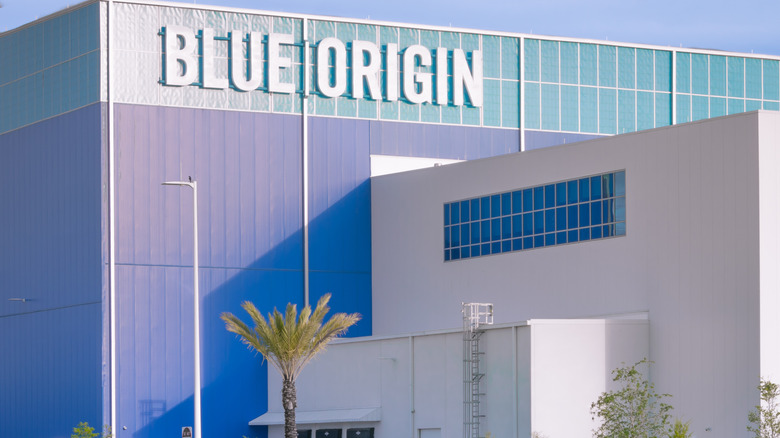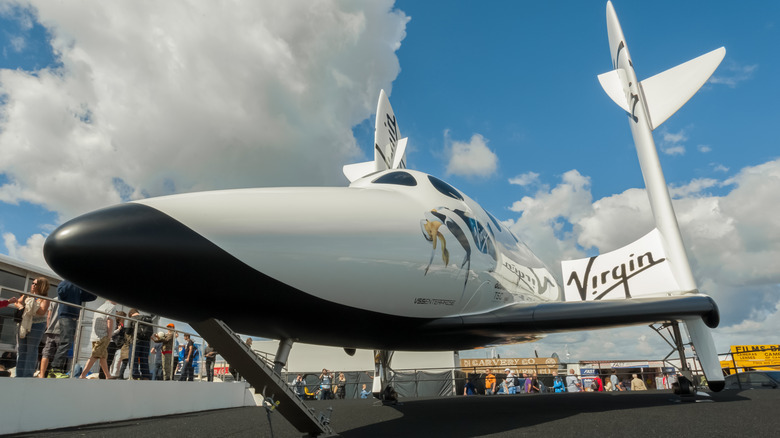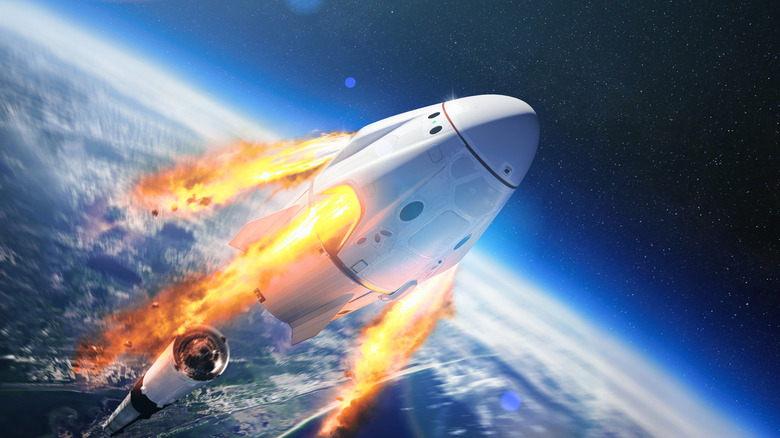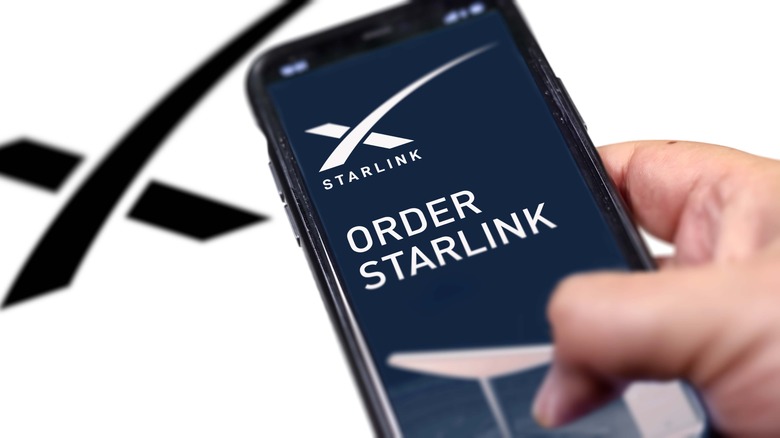These 3 Companies Make Up The Modern-Day Space Race Rivalry
On July 21st, 1969, Neil Armstrong stated those infamous words "That's one small step for man, one giant leap for mankind." Being the first man to step on the moon, and the first human to step on an extraterrestrial object, Neil Armstrong inspired future generations to fully explore the stars and really get a sense of what's out there. Though the Space Race between two nations might've ended with this grandiose feat, today there is a new space age; but this time it is battled by the private sector and corporations as a way to dominate off-Earth resources.
In the summer of 2021, some of Earth's richest men who happen to be billionaires battled to be the first to go to space with their privately-owned space companies, including Jeff Bezos (founder of Blue Origin) and Richard Branson (founder of Virgin Galactic), putting the new space race in headlines over the world. So far, the three biggest players in the game are the aforementioned Blue Origin and Virgin Galactic companies, and Elon Musk's SpaceX, which is already light years ahead of their competition.
Where it Started
Blue Origin became the first major player in the race for private companies to take on the role of space exploration when Amazon founder Jeff Bezos started the company in 2000, per Make Use Of. According to Blue Origin, its mission is to create a world where hundreds of millions of humans are creating communities in space that help take care of the planet back on the ground. The company hopes to create new jobs and economic prospects that allow people to fully live in the cosmos.
The company's highest recorded flight reached heights of 66.5 miles above Earth in July 2021. Jeff Bezos was on that trip. Other times celebrities, like actor William Shatner from "Star Trek," made the journey, becoming the oldest person who had ever gone to the edge of space at 90 years old. The vehicle used to carry them up to space was called the New Shephard and was the third rocket made by the space company, according to MUO. So far, the company has further plans to expand its arsenal of spaceships to continue expanding into the infinite void.
Not Your Traditonial Spaceship
Virgin Galactic, on the other hand, takes a much different approach to how either Blue Origin or SpaceX operates. According to The New York Times, founder of the company Richard Branson wanted to create a space-venturing company specifically aimed at creating thrilling experiences for customers by allowing people to buy private tickets on the company's spacecraft which takes them just to the edge of space. This approach may explain Branson's choice of using a less-traditional rocket and more of a spacecraft that resembles an airplane.
This vehicle also gets launched in an unconventional way, having to be blasted toward the cosmos from a carrier plane while in flight called WhiteKnight Two, per MUO. The company has technically never entered space either, only reaching altitudes of 53.5 miles above Earth, while the Kármán line — where space begins — is 62 miles above Earth. The company claims to have entered space, however, by pointing out how the U.S. uses the 50-mile-marker as the start of space, according to MUO.
Ahead of the Game
SpaceX outpaces both Blue Origin and Virgin Galactic by a lot and then some, boasting some of the most impressive feats a private company has made in developing space technology. For example, the highest altitude a SpaceX rocket has reached is 363 miles above Earth's atmosphere, which is higher than the International Space Station according to MUO.
The company is another cutting-edge enterprise from the mind of eccentric billionaire Elon Musk, co-founder of Tesla, PayPal, the Boring Company, and others according to Time Magazine. Musk started SpaceX with the intention of building a full-fledged human colony on Mars, and eventually colonizing the rest of space, as SpaceX says. Musk's company has taken humans to and from the International Space Station, created reusable rockets, and reached speeds of 24,600 mph in deep space (via MUO).
Still, SpaceX has definitely caused controversy in its practices. Some have environmental concerns, while others say the sheer number of satellites the company wants to put in space is problematic, per The Guardian.
Musk, We've Got a Problem
SpaceX makes its money by fulfilling contracts for government and private organizations, often delivering goods to the International Space Station and charging a fee for said transportation, according to FourWeekMBA. However, in a pursuit to grow more income — possibly in the pursuit of making a Martian colony — SpaceX has invested in a new internet product called Starlink. Starlink is a collection of thousands of satellites that has the plans of eventually enveloping the entire planet and providing high-speed internet to everyone on Earth as long as you have a router to get a signal from, according to CNET.
But this venture is causing many scientists and astronomers to worry about how thousands of satellites in space will affect research in the night sky due to the brightness of the satellites, according to Observer. Still, SpaceX was approved by the Federal Communications Commission (FCC) to put as many as 12,000 satellites into space where they will orbit relatively near the Earth and has applied for clearance to launch thousands more. Blue Origin wants to replicate these intentions in the future, says MUO.
A Bright Future, If We Want It
Though many have their concerns about the privatization of space exploration and how it will affect life on Earth, the achievements of these organizations are remarkable. For instance, SpaceX's ingenuity — and the motive to be profitable — was the first-ever space organization of any type, private or public, that figured out how to recycle a rocket after launch, according to National Geographic. This feat has the possibility to make space travel cheaper and more affordable for future missions, something all space-enthusiasts can be excited about.
Many are concerned with these corporations taking the reign, whether it be astronomers not being able to do research due to thousands of satellites in orbit, or the deaths caused by some rocket-testing for companies like Virgin Galactic. These issues have led to a debate over the role of the private sector when it comes to this new frontier, but only time will tell what these companies bring to the world, and how beneficial they'll be to exploring the stars.
